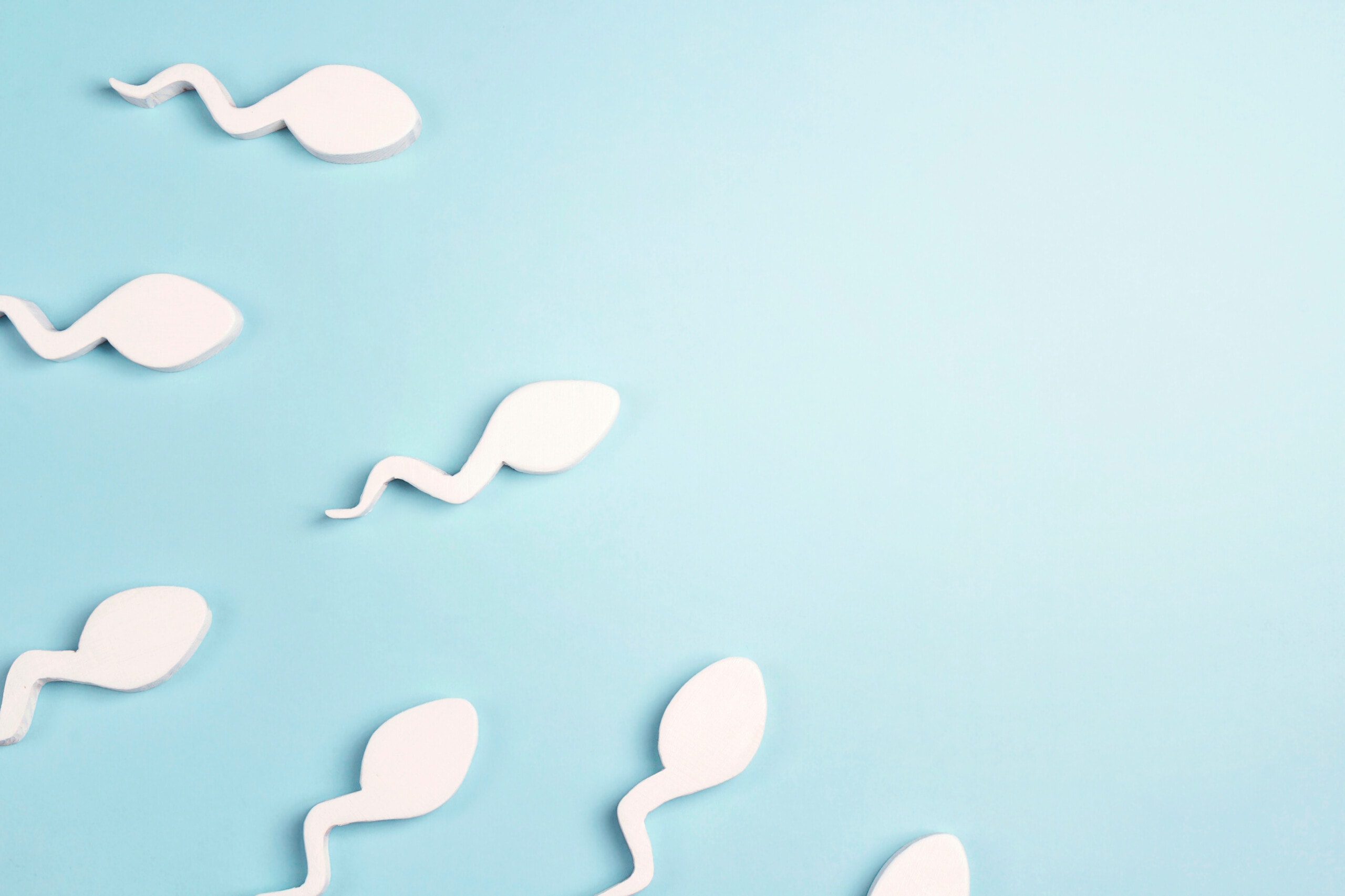Low sperm counts are one of the most common problems couples face when trying to conceive. Some 40% of infertility problems can be attributed to male infertility, with an estimated 7% of all men affected by this.
The symptoms of infertility are not always easy to spot and are often misunderstood, so men might not always consider the possibility of a low sperm count.
Here, we delve into the issue, detailing what a low sperm count means – and how to improve the situation.
What determines sperm health?
Although there are some tell-tale signs of unhealthy sperm, it’s impossible to know for sure unless you have a sample analysed. Only under the microscope will the full picture emerge.
Speak to your GP if you’ve been trying to conceive for more than a year, and they
may then arrange for semen analysis. Analysts will examine three main factors to
determine the health of your sperm.
Quantity
A diminished sperm count is known by the term oligospermia. It’s defined as
having less than 15 million sperm per millilitre of semen. Severe oligospermia is
when you have five million sperm or less per millilitre of semen. When there is no
sperm at all present in semen, it’s known as azoospermia.
High numbers of sperm are required because very few make it the whole way to
an egg for fertilisation.
Movement
To meet their end goal of the egg, sperm must first find their way through the
cervix, uterus and fallopian tubes. To complete this difficult journey, sperm must
be capable of movement, which is sometimes an issue. If there’s not enough
movement – or enough forward movement – and even if there’s plenty of sperm,
there can be no fertilisation.
According to the World Health Organization, healthy sperm will have at least
around 42% total motility, which indicates some movement. But even then, these
mobile sperm could be swimming in small circles and going nowhere. So healthy
sperm normally includes about 30% with progressive motility, which means
they’re moving forward or at least swimming in larger circles.
Structure
Then there’s the structure of sperm to consider, which brings us to the term
morphology. This is concerned with the structure, size and shape of the sperm,
which are all factors in a sperm’s ability to penetrate an egg and fertilise it.
The ideal sperm is smooth, with an oval head and long tail. This form is best for
making the journey to the egg and joining with it to create life.
Even in healthy sperm samples, many sperm will be shaped differently. But for
conception, it’s best if at least 4% of the sperm have an optimal structure. If the
proportion is less than 4%, that’s called teratozoospermia or teratospermia.
How to increase sperm count
Maintain a healthy lifestyle
It’s well known that regular exercise keeps our bodies (and minds) in better shape.
However, studies have also indicated that regular exercise results in both higher
testosterone levels and higher semen quality.
But it’s also important to note that excessive exercise can reduce testosterone
levels. In turn, low testosterone levels can disrupt sperm production. It is therefore
important to keep everything in moderation.
Eat a balanced diet
Of course, a healthy lifestyle also means eating a balanced diet. You should try to
eat plenty of fruit and vegetables (at least five a day), protein (found in fish,
beans and meat) and fibre (favouring wholewheat sources). Plus, it’s important to
drink lots of water and avoid foods with high levels of salt, sugar and saturated
fat.
When you’re trying to improve your fertility, the best policy is always to make sure
you have a balanced diet. A conception supplement like Impryl – with its carefully formulated
blend of micronutrients – can help you achieve that.
Get enough zinc
Zinc stands out as a crucial nutrient for male fertility, playing a vital role in the
generation of sperm, as well as influencing sperm morphology, count and
function. Research shows a direct correlation between zinc levels in semen and
sperm quality, with men experiencing infertility often exhibiting lower zinc
concentrations in their semen.
The human body cannot store zinc, making it even more important that your diet
includes enough of this crucial mineral. You can find it in:
- Fortified breakfast cereals
- Lentils
- Pumpkin seeds
- Oysters
- Crab
- Shrimp
- Beef
- Pork
- Turkey
If you don’t or can’t eat foods with zinc in, you can always use a supplement like
Impryl, which contains zinc at the daily recommended dose and in a form that
can be used by the body.
Quit smoking
The health benefits that come with giving up smoking are well documented and include more energy and less stress.
In addition, studies have reported that smoking results in lower semen volume
and total sperm count. Importantly, the adverse effects on semen and sperm
count were not observed in men who had stopped smoking.
Sperm DNA damage is another factor. Cigarettes contain the heavy metals
cadmium, lead and mercury, which have all been shown to damage sperm DNA.
Minimise stress
Trying to conceive without success can cause you great stress and can even put
strain on your relationship, but it’s important to minimise your stress levels as
much as possible. After all, stress can decrease sexual function and disrupt the
hormones that create sperm.
Try to decrease your stress levels by exercising, spending time outdoors and
making time to do the things that you enjoy.
Being told you have a low sperm count can be hard to hear when you’re trying to
have a baby. However, if you have a better understanding of the issue, you’ll begin
to see that there are positive steps you can take to improve things.
Nutrition plays a vital role, and you can make sure you get the right balance of micronutrients by taking a carefully formulated supplement like Impryl to improve sperm quality. There’s a lot you can do to take action to improve your fertility, so why not start today?
———————————————————————
References
Boitrelle F et al. The Sixth Edition of WHO Manual for Semen Analysis: A Critical Review and SWOT Analysis. Life (Basel). 2021;11(12):1368.
World Health Organization (WHO) (2010). WHO laboratory Manual for the examination of human semen and sperm-cervical mucus interaction. Cambridge Academic Press.
Vaamonde, Diana et al. Physically active men show better semen parameters and hormone values than sedentary men. Eur J Appl Physiol. 2012 Sep;112(9):3267-73. doi: 10.1007/s00421-011-2304-6. Epub 2012 Jan 11.
Pham-Huy LA et al. Free radicals, antioxidants in disease and health. Int J Biomed Sci. 2008 Jun;4(2):89-96.
Romano AD et al. Oxidative stress and aging. J Nephrol. 2010 Sep-Oct;23 Suppl 15:S29-36.
Nagiah S et al. Oxidative stress and air pollution exposure during pregnancy: A molecular assessment. Hum Exp Toxicol. 2015 Aug;34(8):838-47. doi: 10.1177/0960327114559992. Epub 2014 Nov 17.
Agarwal A et al. Effect of oxidative stress on male reproduction. World J Mens Health. 2014 Apr;32(1):1-17. doi: 10.5534/wjmh.2014.32.1.1. Epub 2014 Apr 25.
Sharma RK et al. Role of reactive oxygen species in male infertility. Urology. 1996 Dec;48(6):835-50. doi: 10.1016/s0090-4295(96)00313-5.
Ahmadi S et al. Antioxidant supplements and semen parameters: An evidence based review. Int J Reprod Biomed. 2016 Dec; 14(12): 729–736.
Torres-Arce E et al. Dietary Antioxidants in the Treatment of Male Infertility: Counteracting Oxidative Stress. Biology (Basel). 2021;10(3).
Steels E et al. Physiological aspects of male libido enhanced by standardized Trigonella foenum-graecum extract and mineral formulation. Phytother Res. 2011 Sep;25(9):1294-300. doi: 10.1002/ptr.3360. Epub 2011 Feb 10.
Rao A et al. Testofen, a specialised Trigonella foenum-graecum seed extract reduces age-related symptoms of androgen decrease, increases testosterone levels and improves sexual function in healthy aging males in a double-blind randomised clinical study. 2016 Jun;19(2):134-42. Doi: 10.3109/13685538.2015.1135323. Epub 2016 Jan 20.
Tang Q et al. Semen quality and cigarette smoking in a cohort of healthy fertile men. Environ Epidemiol. 2019 Aug; 3(4): e055. Published online 2019 Jun 25. doi: 10.1097/EE9.0000000000000055.
Massányi P. Effects of Cadmium, Lead, and Mercury on the Structure and Function of Reproductive Organs. Toxics. 2020 Dec; 8(4): 94. Published online 2020 Oct 29. doi: 10.3390/toxics8040094.








